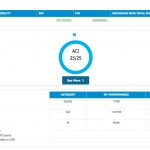Editor’s note: This article was updated on March 21, 2023, to reflect changes to the QPP pathways to meet MIPS reporting requirements and other aspects.
Five years after ditching a pure fee-for-service payment model and instituting a modified fee-for-service model as part of a comprehensive value-based payment program, the Centers for Medicare & Medicaid Services (CMS) have introduced a major addition to the Quality Payment Program (QPP): MIPS Value Pathways (MVPs). And the field of rheumatology is leading the way in this new payment model.
The QPP now consists of three pathways for providers to participate in federal reimbursement systems and meet MIPS reporting requirements:
- Traditional Merit-based Incentive Payment System (MIPS)
- Alternative Payment Model (APM) Performance Pathway
- MIPS Value Pathways (MVPs)
What’s New with the MVP
The MVP program is built on the structure of MIPS, relying on the same four main categories: quality, cost, promoting interoperability and improvement activities. However, the program introduces two standard population health measures that must be used across all MVPs and will be included in the quality score. It also requires that each MVP focuses on a specific aspect of patient care—such as a certain procedure, disease or specialty—and identifies specific quality measures and improvement activities relevant to that focus.
Scoring for each category will largely resemble what was established under MIPS. However, since the two new population health measures are part of the quality category and don’t require any data submission to CMS, providers will essentially only be required to choose and report on four quality measures.

Dr. Harvey
The new MVP model, which is now available for performance year 2023, seeks to alleviate some of the systemic issues that have plagued MIPS by providing clinicians with targeted options and reducing the available quality measures to only those relevant to their specialty. “In MIPS, providers can choose from dozens of quality measures to report on. However, only four are rheumatology-specific. Currently, rheumatologists have to parse through the other dozens of measures to identify those relevant to their practice,” says William Harvey, MD, MSc, FACR, clinical director of rheumatology and associate professor at Tufts University School of Medicine in Boston. Dr. Harvey serves as chair of the ACR’s Committee on Research and Health Information Technology (RHIT).
“The ACR’s RISE registry has helped reduce some of this burden,” Dr. Harvey notes. “RISE users have five additional rheumatology-specific quality clinical data registry measures they can report on for MIPS. Also, RISE staff have reviewed the other MIPS measures and pared down the list to about 30 that are relevant to rheumatology to help supplement measure options. However, the new MVP framework provides an opportunity to focus the efforts of rheumatology providers on aspects of patient care that really matter to them.”
An MVP for Rheumatology
The Advancing Rheumatology Patient Care MVP was created by the ACR and is available through the RISE registry. Through this MVP, rheumatology providers can choose among 10 quality measures highly relevant to rheumatology, including measures specific to treating rheumatology patients and to ensuring the safety of patients who are taking drugs commonly used to treat rheumatic diseases. The MVP also focuses improvement activities on 10 options that have been vetted by rheumatology experts, rather than the 100+ available through traditional MIPS.
According to Dr. Harvey, the Advancing Rheumatology Patient Care MVP will be a significant step toward reducing the federal reporting burden for rheumatology providers. “The rheumatology-specific measures here go beyond rheumatoid arthritis, psoriatic arthritis and even gout. So, in this system, we can track quality of care for many more of our patients and their diagnoses,” he explains. “Let me do what I do every day, and the data we already collect as part of routine practice will flow directly to meet the measures. This idea is behind how we built the MVP.”
Dr. Harvey concludes, “I believe the MVP is a positive step that continues us on a journey away from fee-for-service and toward a far more robust pay-for-performance system. It’s not the final step, but it’s an important intermediate step.”
Allison Plitman, MPA, is the communications specialist for the ACR’s RISE Registry.

